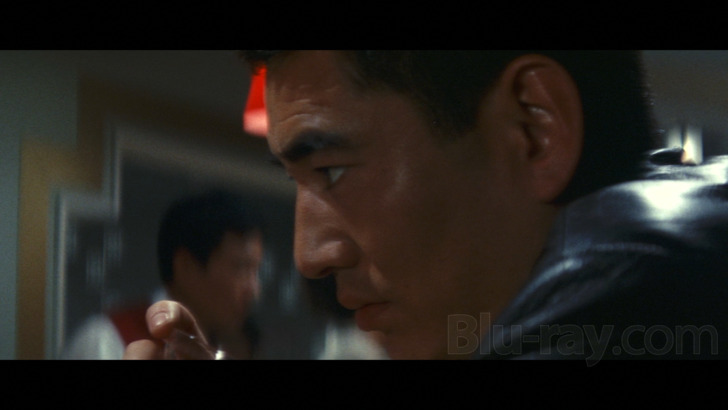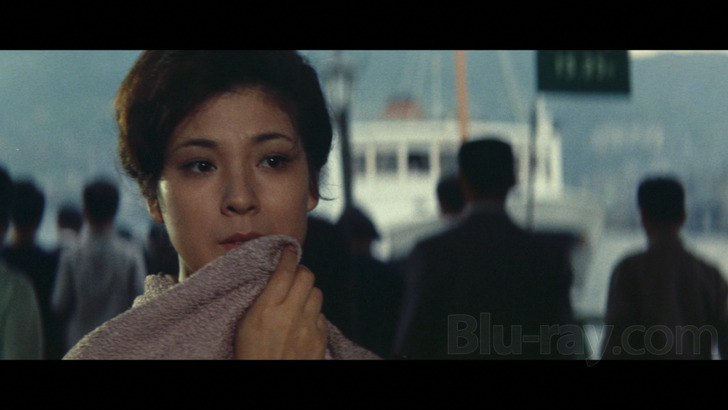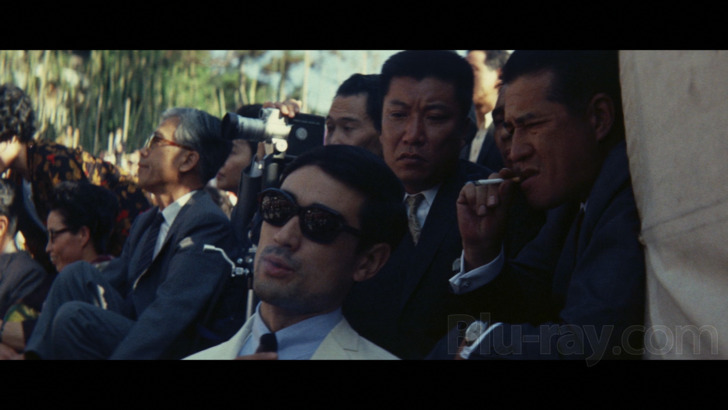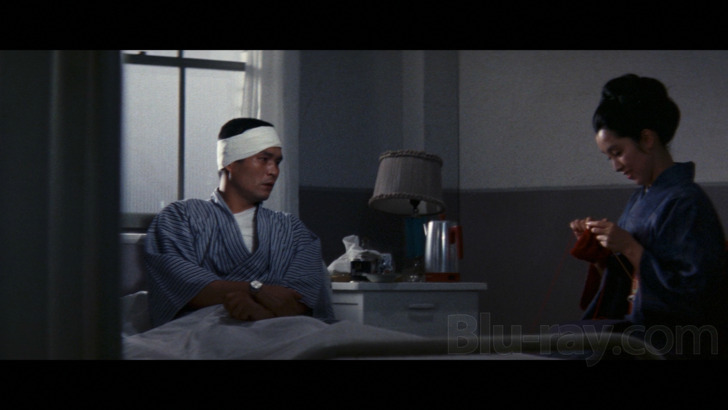Abashiri Prison: Saga of Homesickness Blu-ray Movie
HomeAbashiri Prison: Saga of Homesickness Blu-ray Movie 
網走番外地 望郷篇 / Abashiri bangaichi: Bōkyō-hen | Masters of CinemaEureka Entertainment | 1965 | 89 min | Not rated | No Release Date

Price
Movie rating
6.2 | / 10 |
Blu-ray rating
| Users | 0.0 | |
| Reviewer | 3.5 | |
| Overall | 3.5 |
Overview
Abashiri Prison: Saga of Homesickness (1965)
Shinichi Tachibana returns to his old stomping grounds of Nagasaki and finds himself drawn back into the yakuza world.
Starring: Naoki Sugiura, Kunie Tanaka, Kanjûrô Arashi, Tôru Abe, Ken TakakuraDirector: Teruo Ishii
| Foreign | Uncertain |
| Crime | Uncertain |
| Action | Uncertain |
Specifications
Video
Video codec: MPEG-4 AVC
Video resolution: 1080p
Aspect ratio: 2.35:1
Original aspect ratio: 2.35:1
Audio
Japanese: LPCM 2.0 Mono (48kHz, 24-bit)
Subtitles
English
Discs
Blu-ray Disc
Single disc (1 BD)
Playback
Region A (B, C untested)
Review
Rating summary
| Movie | 3.5 | |
| Video | 3.5 | |
| Audio | 3.5 | |
| Extras | 3.0 | |
| Overall | 3.5 |
Abashiri Prison: Saga of Homesickness Blu-ray Movie Review
Reviewed by Jeffrey Kauffman June 19, 2024 Note: This film is available on Blu-ray as part of Prison Walls: Abashiri Prison I-III.
There seems to be a general consensus based both upon some supplements included with this release as well as any number of other online data
sources
that The Defiant Ones* served as an inspiration for
at
least the first Abashiri Prison film. But as some of those same supplements make clear, that perceived cinematic "connection" really only
pertains to
the last third or so of the first film in a rather celebrated franchise, and in this case without some of the potent subtext of the well remembered
Stanley Kramer film
featuring Tony Curtis and Sidney Poitier. As tangential as The Defiant Ones may therefore be, evidently the idea
of two escaped prisoners shackled to each other and on the run provided some kind of interest for audiences, since this 1965 adaptation
of
a novel by Hajime Itō led to a glut of sequels (the first two of which are included in this set), while an earlier 1959 adaptation of the novel (which
I'm
assuming did not feature two escaped prisoners shackled to each other) seems to have been more or less buried by the vagaries of time
and tide. The supplements on this set get into the unexpected success of Abashiri Prison, a success which perhaps surprisingly was more
abundant with some of the sequels than with the first outing, and not only without that oft mentioned "sophomore slump", but an audience reaction
that was evidently more favorably inclined toward both the second and (perhaps especially) third films.
*Note: The link points to a UK Blu-ray release.

The third Abashiri Prison film was thrust into production almost as quickly as the second, though that perceived "breathing space" for Teruo Ishii to craft an ostensibly more "thoughtful" story. That "thoughtfulness" may have had one glaring lapse, however, as a warning text card before the main presentation offers a disclaimer that there's a character appearing in blackface in the film. What's even more curious is which character it is, at least insofar as some may wonder if the performer tasked with this makeup choice might have had the wherewithal to consent to it.
One way or the other, this is a fairly traditional story of rival gangs which of course Tachibana (Ken Takakura) finds himself in the middle of, though what helps to give the film its emotional immediacy is some further information on what has made Tachibana into the man he is. Attempts at some socioeconomic critiques offer some context in terms of the culture of mid sixties Japan. If the first Abashiri Prison film owed at least its third act in part to The Defiant Ones, perhaps unexpectedly, as Mark Schilling points out in his essay included in this set's insert booklet, the finale of this film was actually modeled on Vera Cruz. Somewhat hilariously, any "meta" film referents are probably irrelevant, as according to Ishii, who is quoted in Schilling's interview, the only thing Toei was interested in was the hit theme song from the first film sung by Ken Takakura reappearing in this outing. warning about blackface
Abashiri Prison: Saga of Homesickness Blu-ray Movie, Video Quality 

Abashiri Prison III is presented on Blu-ray courtesy of Eureka! Entertainment's Masters of Cinema imprint with an AVC encoded 1080p transfer in 2.35:1. There's no technical information provided on this release that I could find in the insert booklet, other than standard verbiage alerting the still uneducated about why there are "black bars" and another warning about 4K UHD setups in particular which may have "motion smoothing" defaults. The back cover offers only a generic "1080p HD presentation of all three films from restorations of the original film elements supplied by Toei". Color timing is improved in this third film when compared to the somewhat sickly looking second outing, with less of a jaundiced appearance in flesh tones, but still some of the same generally excellent support for primaries in particular. Outdoor material can pop agreeably a lot of the time, but can occasionally look a bit wan, with kind of pale greenish rather than bright blue skies. Some night material is bathed in blue and has some murky shadow definition. In an anomaly similar to what I mentioned in Another Abashiri Prison Story Blu-ray review, there is some anamorphic weirdness on occasion here where the entire frame looks like it was but through the M.C. Escher machine, leading to noticeable tilting or slanting (see screenshot 7). There are recurrent signs of age related wear and tear, but rather minor and almost subliminal at times. Grain resolves naturally throughout. My score is 3.75.
Abashiri Prison: Saga of Homesickness Blu-ray Movie, Audio Quality 

Abashiri Prison III features an LPCM 2.0 Mono track in the original Japanese. There's just a bit of crackling and a pretty harsh / bright sounding high end as this track gets going, perhaps due at least in part to the theme music being "recycled". Later cues, including some choral music, tend to sound a bit warmer and less problematic on the high end. Dialogue is rendered cleanly and clearly throughout. Optional English subtitles are available.
Abashiri Prison: Saga of Homesickness Blu-ray Movie, Special Features and Extras 

Eureka has packaged this set with the first two films on Disc One and the third film on Disc Two. The supplements, including the commentaries, can
be
far ranging (i.e., not necessarily limited solely to any given film), and so I'm including the complete array of supplements below.
Disc One ( Abashiri Prison and Abashiri Prison II)
- Abashiri Prison
- Audio Commentary by Tom Mes
- Original Theatrical Trailer (HD; 2:45)
- Abashiri Prison II
- Audio Commentary by Chris Poggiali
- Original Theatrical Trailer (HD; 2:50)
- Audio Commentary by Mike Leeder & Arne Venema
- Original Theatrical Trailer (HD; 2:21)
- Break Out: Jasper Sharp & Mark Schilling Discuss Abashiri Prison (HD; 29:26) is a really enjoyable conversation between these experts which covers the franchise as well as Ishii.
- Interview with Tony Rayns (HD; 30:41) offers more insight from the always informative Rayns, talking here about elements of the films included in this set, but also in a more wide ranging look at the series and in fact "series" as a concept in the Japanese film industry.
Abashiri Prison: Saga of Homesickness Blu-ray Movie, Overall Score and Recommendation 

Some of the participants in the supplements included in this set mention this third outing as their favorite, though it's another film that seems positively divorced from the first aside from its focal character. The use of blackface is probably going to cause reactions for better or worse, though in that regard, it's kind of interesting to think of Ishii perhaps reaching for some kind of "racial" content to mimic the potent subtext of The Defiant Ones. Technical merits are generally solid, and the supplements well done. Recommended.
Similar titles
Similar titles you might also like
(Still not reliable for this title)

Another Abashiri Prison Story
続・網走番外地 / Zoku Abashiri bangaichi | Masters of Cinema
1965

Abashiri Prison
網走番外地 / Abashiri bangaichi | Masters of Cinema
1965

Street Mobster
現代やくざ 人斬り与太 / Gendai yakuza: hito-kiri yota
1972

By a Man's Face Shall You Know Him
男の顔は履歴書
1966

Hokuriku Proxy War
北陸代理戦争 / Hokuriku dairi sensô | Limited Edition
1977

A Certain Killer
ある殺し屋 / Aru koroshi ya
1967

A Killer's Key
ある殺し屋の鍵 / Aru koroshiya no kagi
1967

Gangster VIP
1968

Graveyard of Honor
Jingi no hakaba
1975

The Most Dangerous Game
Mottomo kiken na yuugi / 最も危険な遊戯 / Games of Maximum Risk
1978

Gangster VIP 2
1968

Massacre Gun
Minagoroshi no kenjû
1967

Female Prisoner Scorpion: Death Threat
女囚さそり 殺人予告 / Joshuu sasori: Satsujin yokoku
1991

The Threat
脅迫 | Odoshi | Limited Edition
1966

Crime Hunter: Bullets of Rage
クライムハンタ- 怒りの銃弾
1989

Danger Point: The Road to Hell
Danger Point: 地獄への道
1991

Violent Panic: The Big Crash
Great Collision / Boso panikku: Daigekitotsu / 暴走パニック 大激突
1976

Black Dagger
1968

Heartless
1968

Eight Hours of Terror
8時間の恐怖 / Hachijikan no kyôfu
1957